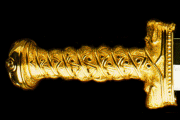Alexander’s Death and Strychnine Poisoning
Unlike many events in
ancient history, the details of Alexander’s death have been
preserved. Five people present at the ill-fated banquet were to
write accounts of the events: Ptolemy, Alexander’s bodyguard, Nearchus,
his admiral, Eumenes, his secretary, Chares,
his chamberlain, and Aristobulus, his military engineer. Although the original
accounts no longer survive, they were cited by a number of writers from the
later
Roman Empire
whose works have been preserved. These
were Diodorus, a Sicilian historian who wrote in the mid-first
century BC; Plutarch, a Greek biographer who wrote around AD 100; and Arrian,
a Roman historian who wrote in the first half of the second century AD.
Additionally, there survives an anonymous Latin work known as the Historia
Alexandri Magni (‘The History of Alexander the Great’) dating
from around AD 250, and the work of Justinus, a Roman historian who lived in the late second
century AD. It is from these classical writings that the circumstances
surrounding Alexander’s death can still be gleaned.
According to the Historia
Alexandri Magni, late in the evening of the banquet Alexander started
showing signs of growing unease and began pacing around the room. After
what appears to have been half an hour or so, his condition became acutely
worse:
"Alexander again sat down beside Medius and, with his hands trembling, complained that it was as if a heavy yoke were upon his neck. When he stood again to drink to Heracles, he shouted with pain as if struck through the stomach with an arrow." (Historia Alexandri Magni, 13:21 )
According to
Diodorus:
"There he drank much unmixed [strong] wine in commemoration of the death of Heracles, and finally, filling a huge beaker, downed it at a gulp. Instantly he shrieked aloud as if smitten by a violent blow." (Diodorus, Universal History, 17:117)
Justinus also refers
to the sudden, stabbing agony, but adds that pain soon spread through
Alexander’ entire body:
"Taking up a cup, he suddenly uttered a groan while he was drinking, as if he had been stabbed with a dagger, and being carried half dead from the table, he was excruciated with such torture that he called for a sword to put an end to it, and felt pain at the touch of his attendants as if he were all over with wounds." (Justinus, Philippic History, 12: 13)
Diodorus tells us
that Alexander continued to get worse during the night:
"His servants put him to bed and attended him closely, but the pain increased and the physicians were summoned. No one was able to do anything helpful and Alexander continued in great discomfort and acute suffering." (Diodorus, Universal History, 17:117)
Diodorus gives no specific details, but the Historia says that Alexander spent the night suffering what appear to have been repeated convulsions, followed by periods of delirium and unconsciousness:
"Throughout the night the king would writhe and shake upon his bed, then he would become still. At other times he would ramble with meaningless words, speaking as it seemed with spirits around his bedchamber." (Historia Alexandri Magni, 13: 21 )
Plutarch not only
refers to the delirium, but also an intense thirst:
"In the rage of his fever and a violent thirst, he took a draught of wine, upon which he fell into delirium." (Plutarch, The Life of Alexander, vs. 75)
According to Arrian,
shortly before he died Alexander was unable to speak, but was still
conscious:
"Lying speechless as the men filed by, he yet struggled to raise his head, and in his eyes there was a look of recognition for each individual as he passed." (Arrian, The Campaigns of Alexander, 7: 26)
Justinus also says
that Alexander was unable to speak. However, he was able to move:
"Being unable to speak, he took his ring from his finger, and gave it to Perdiccas, an act which tranquillized the growing dissension among his friends; for though Perdiccas was not expressly named his successor, he seemed intended to be so in Alexander’s judgment." (Justinus, Philippic History, 12: 17)
For another day
Alexander lingered on, his breathing becoming more labored, until he fell
into a coma and died the following evening.
These, then, were the symptoms Alexander suffered: The initial symptoms
were agitation, tremors, aching or stiffness in the neck, followed by a
sudden, sharp pain in the area of the stomach. He then collapsed and
suffered acute and excruciating agony wherever he was touched.
Alexander also suffered from an intense thirst, fever and delirium, and
throughout the night he experienced convulsions and hallucinations, followed
by periods of calm. In the final stages of the condition he could not
talk, although he could still move his head and arms. Ultimately, his
breathing became difficult and he fell into a coma and died.
When this is compared to the affects of strychnine
poisoning, as described in The Grant Dictionary of Toxicology,
we can see that they are almost identical: Strychnine interferes with inhibitory transmitters, which produce a state of muscle rigidity and stimulation. Soon after ingestion, the first clinical signs are uneasiness and restlessness, anxiety, muscle twitching and stiffness of the neck. After about an hour the solar plexus tightens causing extreme pain. Periods of delirium, hallucinations and tonic convulsion occur shortly afterwards, characterized by sudden contractions of the muscles followed by complete relaxation. The patient may be particularly sensitive to light and noise and can experience a painful reaction to pressure on the skin. Other symptoms include a temperature rise of 2°-4°C above normal, sweating, elevated blood pressure, episodic rapid heart rate, and intense thirst. The final stages of poisoning resemble tetanus with the jaw muscles being completely locked.









